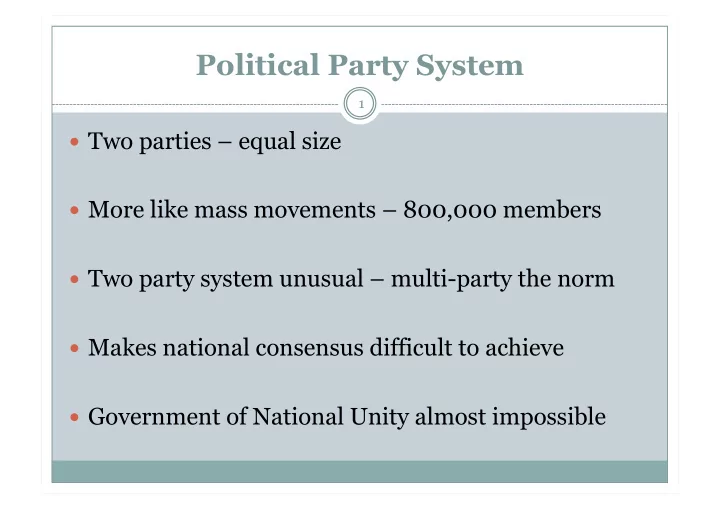

Political Party System 1 Two parties – equal size More like mass movements – 800,000 members Two party system unusual – multi-party the norm Makes national consensus difficult to achieve Government of National Unity almost impossible
Perpetual Civil War 2 Von Clausewitz in reverse? “ Politics is the continuation of war by other means ” Reminiscent of Ireland in the 20s – 50s? NOT a basis for long term solutions “ Ní neart go cur le chéile ”
Political Competition 3 Competition intense – winner takes all Swing vote decisive Pendulum politics – alternating governments Irresponsible politics – vote buying Promise lower taxes and higher spending
Public Finances Crisis 4 Result is unsustainable deficits Masked by EU transfers Plus artificially high growth Driven by domestic demand based on abundant credit Greek crisis has roots in public finances not banking
The Parties 5 Broad coalitions of two traditions New Democracy monarchist and conservative PASOK republican and radical Both formed after the dictatorship Dynastic, factional, weak organisation Need reform – decouple party from personal dynasties
Product of History 6 Turbulent history since independence in 1830 Defeat by Turkey after World War I – 1.5m refugees 500,000 deaths (1941 – 47) due to wars and famine Military dictatorship 1967 – 74 Legacy of hatred – no shared vision
Modern Greece 7 Argue only born in 1980 Basically pre-industrial society Pre-modern state No parliamentary tradition Weak state institutions
Pre-Modern Features 8 Clientilism – clients not citizens Patronage on a grand scale Corruption widespread Tax evasion as a way of life Bloated public service Factionalism
Societal Features 9 Individualism – weak communal identity/civil society Self interest v national interest Protected professions, disengaged elite Weak ‘social ethic’ – solidarity absent Self absorbed – like Northern Ireland Re-inforce “pre-modern” argument
Social Contract 10 Fundamental concept in political science Basis for democratic legitimacy Greece: low taxes, high spending Being re-written unilaterally by government Loss of legitimacy/public anger/street violence
Questions 11 Has Greece (society and state) the capacity to: Overcome the current crisis? Remain a member of the euro? Survive in the long term? Contribute to the European Project?
Overcome Current Crisis? 12 Electorate not educated in spirit of the constitution Dysfunctional political system Huge reform agenda - poor delivery capacity Strong political leadership - but isolated Success depends initially on state capacity to deliver reform
Consequences of Political Culture 13 No sense of responsibility for the crisis No agreed framework of analysis Outright opposition from New Democracy, trade unions, professions, students, media etc. No ownership of solution, no buy-in NOT a basis for long term reform
Consequences 14 Political leadership operating off narrow support base Open to ambush – internal and external Doubts over government’s ability to run full term This adds to feeling of insecurity about future A lot riding on Papandreou
The State – Public Service 15 Public service riddled by patronage No professional civil service Overstaffed, overpaid, generous perks and pensions Under-skilled, poorly organised Unreformed (like 18 th century Ireland)
Consequences 16 Poor quality advice – partisan approach No “ neutral ” civil service The state is weak and inefficient Does not have the capacity to act effectively NOT the basis for long-term reform
The Juvenal Factor 17 “ Who will guard the guardians? ” So, who will reform the reformers? No skills to reform the civil service Outside capacity building programmes needed Fundamental task is reform of the culture
Stay in the euro? 18 Depends on four factors Introduction of “ stability culture ” Implementation of reform agenda Modernisation of economy EU style “ Marshall Plan ”
Economy 19 Closed, no industrial revolution Composed of SMEs and self employed Bureaucratic obstacles to enterprise No development strategy, like Ireland NOT the basis for long-term growth
Ability to Contribute to EU? 20 YES - Greece has four key positives: Cosmopolitan educated elite - new social ethic Institutional framework in place - foundations Cadre of administrators etc - capacity potential Intelligentsia - among the best
Reflections 21 Greek systemic problems known thirty years ago It can comply with conditions for EU membership But not with conditions for euro membership Failure of Greece - failure of euro - failure of EU? Conclusion - save Greece to save euro to save EU
Ireland as a Template 22 Agreed economic development model Multi-party political system encourages policy continuity Efficient civil/public services and institutions “ Neutral ” state, transparency, integrity Social Solidarity - “ Ireland Inc ”
Political Challenge for EU 23 “ We can ’ t do it on our own. We must be made do it. ” “ Please keep up the pressure - don ’ t let up ” . Success lies in political will and state capacity How do we sustain the first and build the second? Formalise “ political ” criteria for euro membership?
Questions 24 Is intrusive interference in MS affairs permissible? Who acts? Other MS, Council, Commission, EP? What is to be done with a failed political entity? Need for political equivalent of Maastricht criteria? Is EU heading for a Directoire?
Closing Remarks 25 Greece can’t do it on its own: a pre – modern society Saving Greece is worthwhile – act of solidarity Needs new political thinking about European integration New EU is 25emerging Modern Greece being built for the first time
Recommend
More recommend